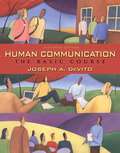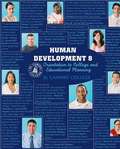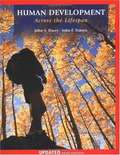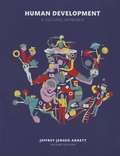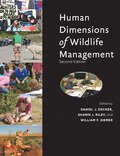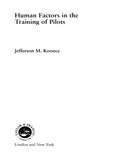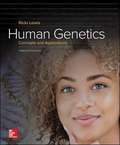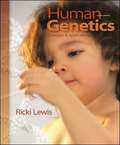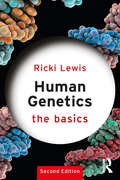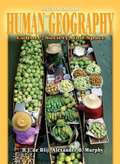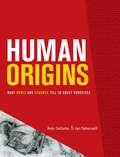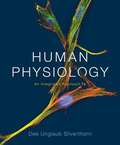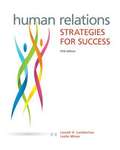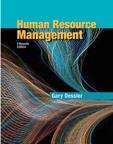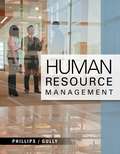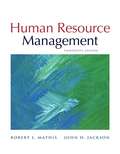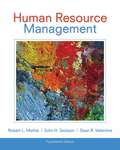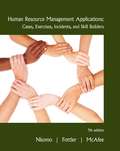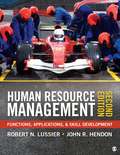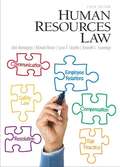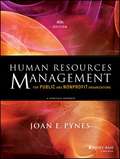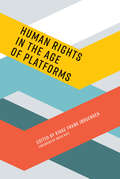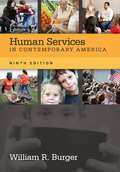- Table View
- List View
Human Communication: The Basic Course (11th edition)
by Joseph A. DevitoDeVito (Hunter College, City University of New York) looks at the concepts and principles that comprise all forms of communication. Emphasizing public speaking, interpersonal communication, and small group communication, the text is designed for introductory college courses in communication for students with little or no prior background in communication. A new series of boxes presents example speeches and speech outlines with suggestions for critical analysis.
Human Development 8: Orientation to College and Educational Planning
by Skip DowningHuman Development 8 is a brief orientation book to El Camino College. This text book aids and guides students in the development of skills and fulfillment of personal goals as well as their dreams
Human Development Across The Lifespan
by John S. Dacey John F. TraversThis chronologically-organized text is briefer than most of the Human Lifespan texts. Its numerous examples drawn from education, nursing, and psychology make the content relevant to students from a variety of majors and backgrounds, while a highly praised study guide integrated into the text promotes and reinforces conceptual understanding. The new edition includes increased material on cognitive development and expanded coverage of culture. .
Human Development: A Cultural Approach
by Jeffrey ArnettHelp students understand how culture impacts development – and why it matters Human Development: A Cultural Approach, Second Edition leads students to examine all stages of development through the engaging lens of culture. The first author to take a wholly cultural approach to human development, Jeffrey Arnett integrates cross-cultural examples throughout the narrative to reveal the impact of cultural factors both in the US and around the world. Arnett’s emphasis on culture fosters a thorough, balanced view of development that prepares students to face challenges in our diverse and globalized world – whether they travel the globe or remain in their hometowns.
Human Dimensions of Wildlife Management
by Daniel J. DeckerUpdated and revised, this classic work is a must-read for every student of wildlife management and every professional seeking to become a better manager.Wildlife professionals can more effectively manage species and social-ecological systems by fully considering the role that humans play in every stage of the process. Human Dimensions of Wildlife Management provides the essential information that students and practitioners need to be effective problem solvers. Edited by three leading experts in wildlife management, this textbook explores the interface of humans with wildlife and their sometimes complementary, often conflicting, interests. The book's well-researched chapters address conservation, wildlife use (hunting and fishing), and the psychological and philosophical underpinnings of wildlife management. Human Dimensions of Wildlife Management explains how a wildlife professional should handle a variety of situations, such as managing deer populations in residential areas or encounters between predators and people or pets.This thoroughly revised and updated edition includes detailed information about• systems thinking• working with social scientists• managing citizen input• using economics to inform decision making• preparing questionnaires• ethical considerations
Human Factors in the Training of Pilots
by Jefferson M. KoonceIn this educational yet entertaining text, Jeff Koonce draws on his 44 years of pilot experience and 31 years as a professor of psychology and human factors engineering in addressing the questions of how to apply sound human factors principles to the training of pilots and to one's personal flying. The author discusses principles of human f
Human Genetics
by LewisToday, human genetics is for everyone. It is about variation more than about illnesses, and increasingly about the common rather than about the rare. Once an obscure science or an occasional explanation for an odd collection of symptoms, human genetics is now part of everyday conversation. By coming to know genetic backgrounds, people can control their environments in more healthy ways. Genetic knowledge is, therefore, both informative and empowering. This edition of Human Genetics: Concepts and Applications shows students how and why that is true
Human Genetics: Concepts and Applications (Ninth Edition)
by Ricki LewisHuman Genetics: Concepts and Applications, ninth edition, is a non-science major's human genetics text that clearly explains what genes are, how they function, how they interact with the environment, and how our understanding of genetics has changed since completion of the human genome project. Meticulously updated, focused on concepts, and rich with personal stories from people whose lives are dramatically affected by the principles being discussed,Human Genetics is a textbook that will prepare the next generation of citizens for the decisions that lie ahead.
Human Genetics: The Basics (The Basics)
by Ricki LewisHuman genetics has blossomed from an obscure biological science and explanation for rare disorders to a field that is profoundly altering health care for everyone. This thoroughly updated new edition of Human Genetics: The Basics provides a concise background of gene structure and function through the lens of real examples, from families living with inherited diseases to population-wide efforts in which millions of average people are learning about their genetic selves. The book raises compelling issues concerning: • The role of genes in maintaining health and explaining sickness • Genetic testing, gene therapy, and genome editing • The common ancestry of all humanity and how we are affecting our future. Written in an engaging, narrative manner, this concise introduction is an ideal starting point for anyone who wants to know more about genes, DNA, genomes, and the genetic ties that bind us all.
Human Geography: Culture, Society, and Space
by H. J. de Blij Alexander B. MurphyAuthoritatively written by a geographer who has worked on every continent, Human Geography is sensitive to people of other cultures and from all walks of life. * Focuses on key geographic concepts and puts them in practical and current perspective. *
Human Learning
by Jeanne OrmrodThe market-leading text on learning theories applied to education, this book draws readers in with a lucid and engaging writing style. It covers a broad range of theoretical perspectives, while including numerous classroom examples of how these theories apply to learning, instruction, and assessment. The market-leading education textbook on learning theories, Human Learning looks at a broad range of theoretical perspectives, including behaviorist, social cognitive, cognitive, constructivist, contextual, and developmental theories. It describes associationistic processes, such as classical and operant conditioning, as well as more complex and distinctly human processes such as metacognition, self-regulated learning, and critical thinking. Using many concrete examples and specific classroom applications, plus a lucid, conversational writing style that truly speaks to students, the author engages students from the start, and makes the concepts, principles, and theories related to human learning and cognition meaningful.
Human Origins: What Bones and Genomes Tell Us About Ourselves
by Rob Desalle Ian TattersallEver since the recognition of the Neanderthals as an archaic form of human in the mid-nineteenth century, the fossilized bones of extinct humans have been used by paleoanthropologists to explore human origins. These bones tell the story of how the earliest humans first emerged in Africa some 6 to 7 million years ago. The bones also reveal that as humans became anatomically and behaviorally more modern, they swept out of Africa in waves into Asia, Europe, and finally into the New World. Even as paleoanthropologists continued to make important discoveries, experts in genetics were looking at the human species from a very different angle. In 1953 James Watson and Francis Crick first envisioned the double helix structure of DNA, the basic building block of all life. In the 1970s it was shown that humans share 98.7 percent of their genes with the great apes--that in fact genetically we are more closely related to chimpanzees than chimpanzees are to gorillas. And most recently the entire human genome has been mapped--we now know where each of the genes are located on the DNA strands that make up our chromosomes. In Human Origins: What Bones and Genomes Tell Us about Ourselves, two of the worlds foremost scientists, geneticist Rob DeSalle and paleoanthropologist Ian Tattersall, show how research into the human genome confirms what fossil bones have told us about human origins. This unprecedented integration of the fossil and genomic records provides the most complete understanding possible of humanity's place in nature, its emergence from the rest of the living world, and the evolutionary processes that have molded human populations to be what they are today.
Human Physiology: An Integrated Approach
by Dee Unglaub SilverthornHuman Physiology: An Integrated Approach has thorough coverage of molecular physiology seamlessly integrated into a traditional homeostasis-based systems approach.
Human Relations: Strategies for Success (Fifth Edition)
by Leslie Minor-Evans Lowell LambertonHuman Relations: Strategies for Success 5e by Lowell Lamberton and Leslie Minor will help you prepare for this changing world. This text covers time-tested, research-based social science and management principles, as well as newer theories and philosophies of human relations drawn from management theory, group theory, personality theory, and relationship theory. More than ever, effective human relations skills are crucial to business success as organizations grow and compete in a global business environment. Employees must have the knowledge and skill to adapt to a workplace where change is frequent and inevitable. Their commitment to the creation of a book that is at once interesting to read, motivating to study, and relevant to a wide variety has been the driving force behind Human Relations: Strategies for Success.
Human Resource Management
by Gary DesslerFor courses in Management. Human Resource Management provides readers with the daily tools and skills they need to function as successful managers--in both human resources and business in general. With a practical approach, the text explores the evolution of the field, highlighting the introduction of revolutionary new technologies and social media platforms such as LinkedIn and cloud computing. The Fifteenth Edition focuses on the positive impacts technology has had on the HR field. The ability to vet potential employees on the Internet shifts more HR responsibilities to managers, leaving HR departments with more time to carry out strategic, long-term endeavors for boosting employee performance and engagement. With a heavy focus on emerging industry trends, the text prepares readers with everything they need to be successful managers and HR personnel in the 21st century.
Human Resource Management
by Jean Phillips Stanley GullyThe focus of HUMAN RESOURCE MANAGEMENT is on developing students' personal and managerial skills by (1) Helping students understand the role of HR in organizational effectiveness as well as their personal career success; (2) Enabling students to understand how to flexibly apply the HR concepts that are appropriate for different problems or situations, and how HR both influences and is influenced by business strategy; and (3) Creating an understanding of the HR context by embedding the important concepts of ethics, diversity, competitive advantage, and the global context throughout the book. This highly readable book will help students understand how to use HR to hire, develop, motivate, and retain the right people and bring out the best in employees to execute the company's business strategy. It is intended for anyone who is or who might become a manager or an HR professional. By developing readers' competence and confidence in using important HR skills, this book will help anyone become a more effective manager through a better use of HR tools. Because most students learn more easily when they see the applicability of concepts to real life situations, HUMAN RESOURCE MANAGEMENT provides numerous current company examples throughout the book. A book-long integrated case supplemented with interactive online videos develops students' personal skills and gives them some experience in applying various HR concepts. The case and videos reinforce the relevance of the textbook material and make the content even more understandable.
Human Resource Management (13th Edition)
by Robert L. Mathis John H. JacksonTrust the authoritative resource for human resource management to offer the most current look at HR and its impact on today's organizations with both new and thoroughly updated cases and today's most recent examples--90 percent of which are from 2006 and beyond. Mathis/Jackson's HUMAN RESOURCE MANAGEMENT, Thirteenth Edition, is the most trusted resource and best-selling HR solution for preparing future or currently practicing HR professionals. Updated, strong academic coverage, including the latest 2009 HRCI outline, ensures this edition addresses all major topics for professional examinations (PHR, SPHR) given by the Human Resource Certification Institute (SHRM). The latest HR research and a wealth of new and proven learning features in every chapter demonstrate how HR impacts organizational strategy. Reorganized and streamlined topics examine emerging trends in technology, globalization, and HR Metrics, as well as other developments impacting the practice of HR today. A complete package of teaching and learning resources, including new CourseMate online learning tools, helps today's aspiring professionals prepare for career and future HR success.
Human Resource Management (Fourteenth Edition)
by Robert L. Mathis John H. Jackson Sean R. ValentinePrepare for career and HR success with the best-selling text that has set the standard for excellence in human resource management. Mathis/Jackson's HUMAN RESOURCE MANAGEMENT, Fourteenth Edition, offers the most current look at HRM and its impact on the success of organizations today. Whether you are a practicing or future human resource management professional, or need to prepare for HR certification, this comprehensive market-leading text clearly introduces the latest HR research and unforgettable examples of HR in action that you need for success. A leading resource in preparing for professional HR certification, this edition provides solid readable coverage to ensure you address all major topics for the PHR and SPHR professional examinations given by the Human Resource Certification Institute (SHRM). The latest HR research and an effective blend of solid theory and contemporary practice highlight emerging trends driving change in HRM today, including technology, globalization, and HR metrics. The book's accompanying CourseMate online learning tools help you further achieve professional career and HR success. Trust the authoritative resource for human resource management to offer the most current look at HR and its impact on today's organizations. Mathis/Jackson's HUMAN RESOURCE MANAGEMENT, Fourteenth Edition, is the most trusted resource and best-selling HR solution for preparing future or currently practicing HR professionals.
Human Resource Management Applications
by Stella M. Nkomo Myron D. Fottler R. Bruce McafeeStrengthen your practical understanding of today's human resource management (HRM) with this single source for actual cases, unique exercises and skill builders. HUMAN RESOURCE MANAGEMENT APPLICATIONS: CASES, EXERCISES, AND SKILL BUILDERS, 7E focuses on the abilities most important in HRM today with timely new cases and applications drawn from a variety of real organizations, including those in today's growing service sector. Learn to effectively handle some of today's controversial issues, such as environmentally friendly HR policies, the use of social networking, and same-sex benefits. This book perfectly complements your study of introductory human resource management with brief, yet powerful, exercises and a comprehensive project that helps you refine the skills most important for success in any HRM or business career.
Human Resource Management: Functions, Applications, and Skill Development 2nd Edition
by Robert N. Lussier John R. HendonHuman Resource Management: Functions, Applications, and Skill Development, Second Edition, featuring the 2013 Society for Human Resource Management (SHRM) Human Resource Curriculum Guide, explores important HRM concepts and functions with a strong emphasis on skill development, critical thinking, and application. In this fully-revised edition, all 210 required SHRM topics are noted within the chapter content as Robert N. Lussier and John Hendon prepare students to develop HRM skills they can use in their personal and professional lives. Students stay engaged through a wide variety of activities and tools that allow them to immediately apply HR functions and concepts.
Human Resources Law (Fifth Edition)
by John Remington Richard Heiser Cyrus F. Smythe Kenneth L. SovereignThis text offers a comprehensive treatment of the entire subject of personnel law that reflects the author's personal experience as both a practising lawyer and personnel director.
Human Resources Management For Public And Nonprofit Organizations: A Strategic Approach
by Joan E. PynesSince the first edition was published in 1997, Human Resources Management for Public and Nonprofit Organizations has become the go-to reference for public and nonprofit human resources professionals. Now in its fourth edition, the text has been significantly revised and updated to include information that reflects changes in the field due to the economic crisis, changes in federal employment laws, how shifting demographics affect human resources management, the increased use of technology in human resources management practices, how social media has become embedded in the workplace, and new approaches to HRM policy and practice. Written by Joan E. Pynes--a noted expert in public administration--this authoritative work shows how strategic human resources management is essential for managing change in an increasingly complex environment. The book Includes new material on workplace violence and employee discipline.
Human Rights in the Age of Platforms (Information Policy)
by Rikke Frank JørgensenScholars from across law and internet and media studies examine the human rights implications of today's platform society.Today such companies as Apple, Facebook, Google, Microsoft, and Twitter play an increasingly important role in how users form and express opinions, encounter information, debate, disagree, mobilize, and maintain their privacy. What are the human rights implications of an online domain managed by privately owned platforms? According to the Guiding Principles on Business and Human Rights, adopted by the UN Human Right Council in 2011, businesses have a responsibility to respect human rights and to carry out human rights due diligence. But this goal is dependent on the willingness of states to encode such norms into business regulations and of companies to comply. In this volume, contributors from across law and internet and media studies examine the state of human rights in today's platform society.The contributors consider the “datafication” of society, including the economic model of data extraction and the conceptualization of privacy. They examine online advertising, content moderation, corporate storytelling around human rights, and other platform practices. Finally, they discuss the relationship between human rights law and private actors, addressing such issues as private companies' human rights responsibilities and content regulation.ContributorsAnja Bechmann, Fernando Bermejo, Agnès Callamard, Mikkel Flyverbom, Rikke Frank Jørgensen, Molly K. Land, Tarlach McGonagle, Jens-Erik Mai, Joris van Hoboken, Glen Whelan, Jillian C. York, Shoshana Zuboff, Ethan ZuckermanOpen access edition published with generous support from Knowledge Unlatched and the Danish Council for Independent Research.
Human Sacrifice in Ancient Greece
by Dennis D. HughesNumerous ancient texts describe human sacrifices and other forms of ritual killing: in 480 BC Themistocles sacrifices three Persian captives to Dionysus; human scapegoats called pharmakoi are expelled yearly from Greek cities, and according to some authors they are killed; Locrin girls are hunted down and slain by the Trojans; on Mt Lykaion children are sacrificed and consumed by the worshippers; and many other texts report human sacrifices performed regularly in the cult of the gods or during emergencies such as war and plague. Archaeologists have frequently proposed human sacrifice as an explanation for their discoveries: from Minoan Crete children's bones with knife-cut marks, the skeleton of a youth lying on a platform with a bronze blade resting on his chest, skeletons, sometimes bound, in the dromoi of Mycenaean and Cypriot chamber tombs; and dual man-woman burials, where it is suggested that the woman was slain or took her own life at the man's funeral. If the archaeologists' interpretations and the claims in the ancient sources are accepted, they present a bloody and violent picture of the religious life of the ancient Greeks, from the Bronze Age well into historical times. But the author expresses caution. In many cases alternative, if less sensational, explanations of the archaeological are possible; and it can often be shown that human sacrifices in the literary texts are mythical or that late authors confused mythical details with actual practices.Whether the evidence is accepted or not, this study offers a fascinating glimpse into the religious thought of the ancient Greeks and into changing modern conceptions of their religious behaviour.
Human Services in Contemporary America (Ninth Edition)
by William R. BurgerDesigned for introductory college courses in human services, mental-health technology, social work, community mental health, and other human services programs.
